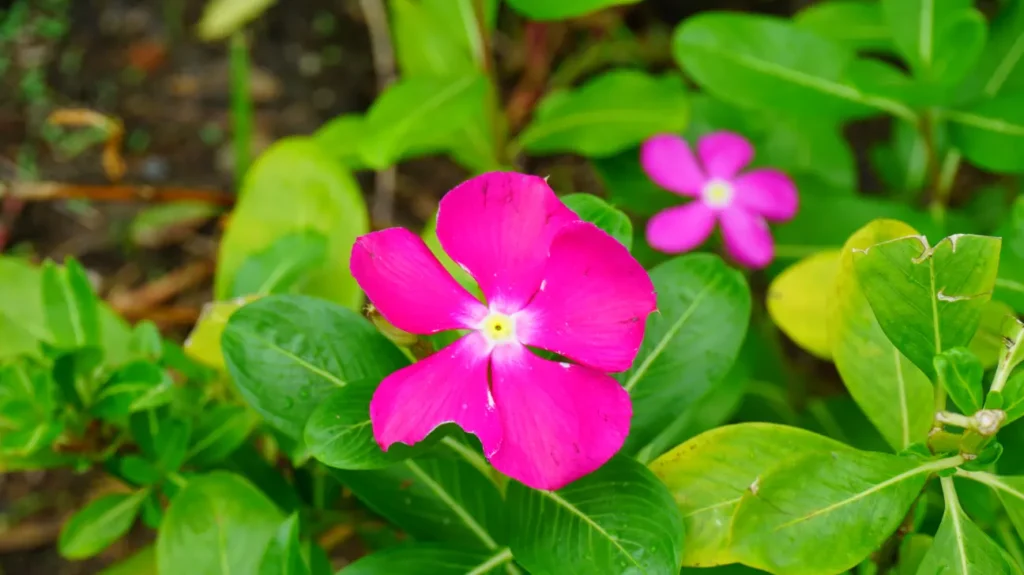The Madagascar periwinkle (Catharanthus roseus), also known as the rosy periwinkle, is a plant of great interest in both traditional and modern medicine. Originating from Madagascar, it has spread worldwide, admired for its attractive flowers and valued for its potent medicinal properties. Historically used to treat various ailments, the Madagascar periwinkle has gained attention as a potential nootropic, with early research indicating cognitive benefits. This article explores the chemical composition, physiological mechanisms, potential cognitive effects, safe usage guidelines, and known interactions, providing a comprehensive overview of this remarkable plant’s capabilities as a nootropic supplement.
You May Also Like:
Sources and Chemistry
The Madagascar periwinkle belongs to the Apocynaceae family, a group of plants known for producing biologically active alkaloids. Traditionally used in the folk medicine of various cultures, particularly in Southeast Asia, it has served to treat conditions like diabetes, fever, and infections. Today, it is recognized in pharmacology for its complex chemistry and diverse therapeutic applications, particularly in oncology and, more recently, as a potential cognitive enhancer.
Key Active Compounds
The main active constituents of Madagascar periwinkle are vinca alkaloids, including vincristine, vinblastine, and vincamine, which contribute to its wide-ranging physiological effects. The following highlights some of the plant’s most significant compounds:
- Vincristine and Vinblastine: Primarily known for their anticancer properties, vincristine and vinblastine work by inhibiting cell division, making them effective in treating certain types of leukemia and lymphoma. While these compounds do not directly influence cognitive function, their structural similarity to vincamine has prompted research into the neuropharmacology of other vinca alkaloids.
- Vincamine: Unlike vincristine and vinblastine, vincamine is widely researched for its cognitive-enhancing properties. It acts as a cerebral vasodilator, improving blood flow to the brain, and is commonly used in Europe for conditions involving age-related cognitive decline and cerebrovascular insufficiency. Vincamine is particularly notable for its potential nootropic effects, which arise from improved cerebral circulation, oxygen delivery, and glucose metabolism.
- Ajmalicine, Lochnericine, and Serpentine: Other alkaloids such as ajmalicine and lochnericine may also contribute to Madagascar periwinkle’s neuroactive profile. Ajmalicine, for instance, has been shown to modulate neurotransmitters, which could benefit mood and cognitive stability. Serpentine is known for its hypotensive effects, which may have implications for individuals with hypertension but must be monitored carefully to avoid hypotension.
Antioxidants and Flavonoids
In addition to alkaloids, Madagascar periwinkle contains flavonoids and other antioxidant compounds that contribute to its neuroprotective effects. Antioxidants combat oxidative stress—a process that damages cells and is associated with aging and cognitive decline. By neutralizing free radicals, these compounds may help protect neurons, potentially preserving cognitive function and reducing the risk of neurodegenerative disorders.
Promote Brain Vitality and Stress Relief with Potassium Supplements—Order Today on Amazon!

Physiological Mechanism of Action in the Brain
Madagascar periwinkle’s nootropic potential is largely attributed to vincamine’s effects on cerebral blood flow, neurotransmitter modulation, and antioxidant activity, each playing a role in supporting cognitive function.
- Cerebral Blood Flow Enhancement: Vincamine acts as a vasodilator, specifically targeting blood vessels in the brain. By dilating cerebral blood vessels, it increases the delivery of oxygen and glucose to brain tissues. The brain, despite constituting only about 2% of body weight, consumes approximately 20% of the body’s oxygen and glucose, highlighting its dependence on adequate blood flow for optimal function. Enhanced cerebral circulation may improve attention, memory, and mental clarity, which is why vincamine is commonly prescribed for conditions related to cerebral insufficiency in Europe.
- Neurotransmitter Modulation: Vincamine and related alkaloids may affect neurotransmitter levels, particularly those of dopamine and serotonin. Dopamine is crucial for processes like attention, motivation, and reward-based learning, while serotonin is involved in mood regulation and emotional stability. By modulating these neurotransmitters, Madagascar periwinkle could support cognitive functions like focus and memory while helping to stabilize mood, which indirectly benefits cognitive performance under stress.
- Antioxidant and Neuroprotective Properties: Madagascar periwinkle’s flavonoids and other antioxidants help protect neurons from oxidative stress. This neuroprotective effect is vital for maintaining cognitive health over time, as oxidative damage to neurons is a contributing factor to cognitive decline and neurodegenerative diseases. The plant’s antioxidants may preserve brain cell integrity, supporting long-term cognitive resilience.
Potential Nootropic Benefits
Although the Madagascar periwinkle is primarily studied for its anticancer properties, early research and anecdotal evidence suggest it may offer cognitive benefits. Here are some of the possible nootropic advantages associated with this plant:
- Enhanced Mental Clarity and Focus: By increasing cerebral blood flow, vincamine may improve mental clarity, focus, and concentration. This benefit is especially relevant in scenarios requiring sustained mental effort, making Madagascar periwinkle a potentially effective supplement for those with demanding cognitive tasks.
- Memory Support: Improved blood flow to the brain enhances the supply of oxygen and glucose, which are critical for memory formation and retrieval. Additionally, the modulation of dopamine and serotonin could support working memory, as these neurotransmitters are involved in cognitive processes related to information retention and recall.
- Mood Regulation and Stress Relief: Madagascar periwinkle’s effects on serotonin suggest it could have mood-stabilizing properties. A balanced mood is essential for cognitive function, as chronic stress and mood instability can impair concentration and memory. By supporting emotional stability, Madagascar periwinkle could indirectly enhance cognitive resilience.
- Long-Term Neuroprotection: Antioxidants in Madagascar periwinkle may protect brain cells from oxidative damage, which is linked to cognitive aging and neurodegenerative conditions. The neuroprotective effects could benefit individuals seeking to preserve cognitive health over time, potentially reducing the risk of age-related cognitive decline.

Dosage and Supplementation Guidelines
The appropriate dosage of Madagascar periwinkle for cognitive enhancement has not been definitively established due to limited clinical research. However, vincamine, one of its primary active compounds, is often used in doses ranging from 10-30 mg per day for cognitive support. It is essential to note that Madagascar periwinkle’s use as a supplement should be approached cautiously, as the plant contains potent bioactive compounds that may have side effects or interactions with other medications.
- General Cognitive Support: For general nootropic benefits, starting with the lowest effective dose (around 5-10 mg of vincamine daily) and gradually increasing may be prudent. Always consult with a healthcare provider to determine an individualized dosage plan.
- Formulations: Madagascar periwinkle is available in various forms, including tinctures, capsules, and powders. Standardized extracts that specify vincamine content may provide more reliable dosing for those seeking cognitive enhancement.
- Duration and Cycling: To prevent tolerance buildup, users may benefit from cycling the supplement, such as using it for 4-5 days per week with breaks in between.
Support Clear Thinking and Mental Agility with Effective Nootropics—Order Today on Amazon!

Side Effects and Safety Considerations
Madagascar periwinkle is generally safe when used in moderate doses; however, the plant’s alkaloid content can cause side effects, particularly at higher doses. Common side effects include:
- Gastrointestinal Discomfort: Symptoms such as nausea, vomiting, and stomach cramps have been reported, especially with unregulated or high doses.
- Blood Pressure Changes: Vincamine’s vasodilatory effects can lead to fluctuations in blood pressure. Hypotension (low blood pressure) is a possible side effect, especially in individuals already taking antihypertensive medications.
- Neurological Symptoms: High doses may cause dizziness, headaches, and, in rare cases, seizures due to altered neurotransmitter levels.
Due to these potential side effects, individuals considering Madagascar periwinkle as a nootropic should consult a healthcare provider, particularly if they have pre-existing health conditions or are taking other medications.
Interactions with Other Supplements and Medications
Madagascar periwinkle may interact with various supplements and medications, necessitating caution.
- Anticoagulants: Vincamine can enhance blood flow, potentially interacting with blood-thinning medications like warfarin or aspirin. This combination could increase the risk of bleeding, especially in those with clotting disorders.
- Antihypertensive Drugs: Given its blood pressure-lowering effects, Madagascar periwinkle may interact with antihypertensive medications, leading to excessively low blood pressure. Monitoring blood pressure is recommended for individuals on these medications.
- Stimulants and Other Nootropics: Combining Madagascar periwinkle with other nootropics, especially those that increase dopamine (e.g., L-tyrosine), could potentially lead to overstimulation, resulting in anxiety, jitteriness, or headaches.
- Monoamine Oxidase Inhibitors (MAOIs): As Madagascar periwinkle influences dopamine and serotonin levels, individuals taking MAOIs should exercise caution due to the risk of excessive neurotransmitter activity.
Risks for Individuals with Certain Health Conditions
Madagascar periwinkle may pose risks to individuals with specific health conditions, warranting careful consideration before use.
- Pregnancy and Breastfeeding: The plant’s alkaloid content has the potential to cross the placental barrier and affect fetal development. Consequently, Madagascar periwinkle should be avoided during pregnancy and breastfeeding.
- Liver and Kidney Disease: Given that the liver and kidneys are responsible for metabolizing and excreting alkaloids, individuals with compromised hepatic or renal function should use Madagascar periwinkle cautiously. Accumulation of these compounds could exacerbate liver or kidney impairment.
- Neurological Disorders: People with conditions such as epilepsy or Parkinson’s disease should exercise caution, as Madagascar periwinkle’s influence on neurotransmitter pathways could interact with existing neurological therapies or exacerbate symptoms.

Conclusion: Is Madagascar Periwinkle a Viable Nootropic?
Madagascar periwinkle holds potential as a nootropic supplement, thanks to its vasodilatory, neuroprotective, and mood-stabilizing effects. However, more clinical research is necessary to establish its efficacy and safety in enhancing cognitive function. For those considering Madagascar periwinkle as a supplement, it is essential to consult a healthcare provider to determine a safe and effective dose and to ensure that it does not interfere with existing medications or health conditions.
While Madagascar periwinkle offers intriguing possibilities as a cognitive enhancer, its potent bioactive compounds necessitate cautious use, particularly given the lack of extensive clinical research on its safety profile for regular cognitive support. With the right guidance and dosing, Madagascar periwinkle may provide benefits for those seeking natural cognitive enhancement, but it remains a supplement best suited for individuals who can carefully monitor their response and adjust their usage as needed.

References:
- Madagascar periwinkle alkaloids: Biosynthesis, ethnobotanical attributes, and pharmacological functions. Retrieved from: https://www.sciencedirect.com/science/article/abs/pii/S0254629922005166
- Antidiabetic and Antioxidant Properties of Alkaloids from Catharanthus roseus (L.) G. Don. Retrieved from: https://www.mdpi.com/1420-3049/18/8/9770
- Flavonoid glucosides from the hairy roots of Catharanthus roseus. Retrieved from: https://pubmed.ncbi.nlm.nih.gov/19271765/
Important Note: The information contained in this article is for general informational purposes only, and should not be construed as health or medical advice, nor is it intended to diagnose, prevent, treat, or cure any disease or health condition. Before embarking on any diet, fitness regimen, or program of nutritional supplementation, it is advisable to consult your healthcare professional in order to determine its safety and probable efficacy in terms of your individual state of health.
Regarding Nutritional Supplements Or Other Non-Prescription Health Products: If any nutritional supplements or other non-prescription health products are mentioned in the foregoing article, any claims or statements made about them have not been evaluated by the U.S. Food and Drug Administration, and such nutritional supplements or other health products are not intended to diagnose, treat, cure, or prevent any disease.


